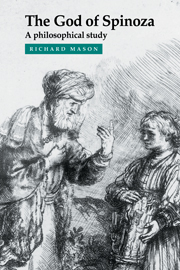Book contents
- Frontmatter
- Contents
- Preface
- List of abbreviations
- Introduction: Spinoza's many contexts
- PART I THE GOD OF THE PHILOSOPHERS
- PART II THE GOD OF ABRAHAM, OF ISAAC AND OF JACOB
- PART III THE GOD OF SPINOZA
- 8 Choosing a religion
- 9 The figure of Christ
- 10 Understanding eternity
- 11 Why Spinoza?
- Bibliography
- Index
10 - Understanding eternity
Published online by Cambridge University Press: 06 January 2010
- Frontmatter
- Contents
- Preface
- List of abbreviations
- Introduction: Spinoza's many contexts
- PART I THE GOD OF THE PHILOSOPHERS
- PART II THE GOD OF ABRAHAM, OF ISAAC AND OF JACOB
- PART III THE GOD OF SPINOZA
- 8 Choosing a religion
- 9 The figure of Christ
- 10 Understanding eternity
- 11 Why Spinoza?
- Bibliography
- Index
Summary
Proposition 23 of Part v of the Ethics says:
The human mind cannot be absolutely destroyed along with the body, but something of it remains, which is eternal.
A demonstration is offered. The scholium to the proposition adds that ‘we feel and experience that we are eternal’.
These views seem to form the apex of Spinoza's system, coming almost at the end of the Ethics as the apparent culmination of a long series of connected propositions. Although they are not particularly emphasised – Spinoza left his readers to decide what mattered – it would seem strange to imagine that they were not of importance to him.
To commentators, these views form the apex of his system in another way: as a pinnacle of difficulty, or a stumbling-block for the understanding. Some have just give up on Spinoza at this point, believing that he had extended himself beyond any rational defence or explanation of his position, lapsing into paradox or mysticism. Others have avoided the real problems of interpretation with rhetoric. Even Pollock, normally so lucid, offers no better than this:
Spinoza's eternal life is not a continuance of existence but a manner of existence; something which can be realized here and now as much as at any other time or place; not a future reward of the soul's perfection but the soul's perfection itself. In which, it is almost needless to remind the reader, he agrees with the higher and nobler interpretation of almost all the religious systems of the world.
- Type
- Chapter
- Information
- The God of SpinozaA Philosophical Study, pp. 224 - 246Publisher: Cambridge University PressPrint publication year: 1997



